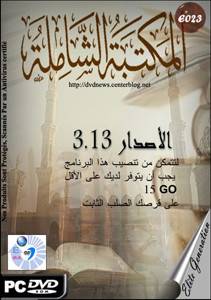

In their reaction, the forum moderators thanked al-Turāth for their huge service to the field and Islām, but also defended its forum members involved in the creation and distribution of the program as driven only by love for Islam.

In its statement, al-Turāth apologized for their earlier reaction, before explaining in detail why it considered the program an act of theft (of digitized texts and specialized data) that would kill off not only the company but also all industry-led digitization efforts. A new discussion thread was eventually opened on 7 May, with a statement from al-Turāth and a response from the forum moderators.

This post led to such a heated discussion that the forum moderators had to remove the thread, and ban all content related to al-mawsūʿa al-shāmila on.
#AL MAKTABA SHAMELA SOFTWARE#
So much so that the pioneering publishing house of digital texts, Markaz al-Turāth lil-barāmijāt (the publisher of al-Jāmiʿ al-Kabīr, that other main source of texts in our corpus), launched an acrimonious attack against the program on the Ahl al-Ḥadīth forum, accusing Nāfiʿ of stealing its software and content.
#AL MAKTABA SHAMELA FREE#
When the program, containing 969 free books, first appeared on internet fora for Islamic scholars in early 2005, it met with a lot of enthusiasm. The program was created by an Egyptian member of the Ahl al-Ḥadīth forum known only as Nāfiʿ (often referred to affectionately on specialized internet fora as al-akh Nāfiʿ “Brother Nāfiʿ” or duktūr / al-ustādh Nāfiʿ “Dr. In its first iteration, it was called al-mawsūʿa al-shāmila (“The Comprehensive Encyclopaedia”). After seemingly conciliatory rhetoric from both sides, the discussion turned bitter again, resulting in repeated accusations of piracy and calls for a boycott flying in both directions. Read more He also vowed to create a new version of the program that did not include any book taken from a commercial product. He claimed not to have shared his program with more than a handful of scholars, and to have been surprised when he noticed, two years later, another member of the Ahl al-Ḥadīth forum, with whom he had not shared the program, and whom he did not even know, offering it (for free) to other members. While admitting these included books from al-Turāth, he strenuously denied that Shamela was “al-Turāth in another jacket”, adducing proof that he had included books and data from many different sources. In his statement, he claimed he had developed the program for himself, to enable him to simultaneously search the different collections of digital books all of which he had legally. The discussion lasted for weeks, and eventually prompted Nāfiʿ, the creator of the program himself, to react in a post on the forum.


 0 kommentar(er)
0 kommentar(er)
